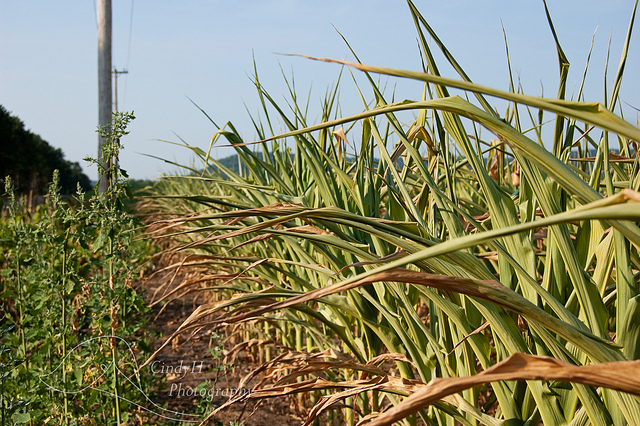Cornucopia’s Take: Although President Trump says he does not believe the findings from the National Climate Assessment (prepared jointly by 13 federal agencies), many farmers are already experiencing climate-related hardships. Cornucopia has always supported sustainability in agriculture, one of the fundamentals of organics. Future adaptations will be needed to address expected changes in climate and ecosystems.
Hotter and drier, with a drop in production, is the future of U.S. agriculture
The FERN
by Chuck Abbott
 |
Source: Cindy |
Climate change will bring higher temperatures and more frequent drought to farmers across the United States, resulting in reduced crop and livestock yields, according to the National Climate Assessment that was released over the weekend. Heat stress could reduce corn yields in the Midwest, the heart of corn and soybean production, by as much as 25 percent below their expected mid-century levels.
Hot spells in the Midwest at mid-century routinely would be 5 degrees F higher than at the end of the 20th century, reaching into crop-stunting ranges. “One year out of 10 is is projected to have a five-day period that is an average of 13 degrees F warmer than a comparable period at the end of last century,” said the report. Soybean yields would fall more than 25 percent from otherwise-expected levels in the southern half of the Midwest but could increase in the northern half. “In particular, heat stress in maize during the reproductive period is projected by crop models to reduce yields in the second half of the 21st Century.”
In looking at the impact on U.S. agriculture nationwide, the report said “increases are expected in the incidence of drought and elevated growing-season temperatures.” Hot and dry weather “will exacerbate plant stress, yield reduction, fire risks and depletion of surface and ground water resources.” Yields from crops such as corn, soybeans, wheat, rice, sorghum, cotton and oats decline when it is too hot. Weeds, however, would grow faster and be harder to control. “Expected increase in challenges to livestock health, declines in crop yields and quality, and changes in extreme (weather) events in the United States and abroad threaten rural livelihoods, sustainable food security and price stability.”
“The over-arching message for agriculture is unambiguous,” said Marcia DeLonge of the Union of Concerned Scientists. “Climate change is already impacting farms and ranches nationwide and there are many challenges ahead … Climate change impacts — including declining productivity, price shocks from extreme weather, and effects on food processing, storage, transportation — could lead to even lower levels of food security in the United States and worldwide.”
Plant breeders are developing heat- and drought-tolerant varieties to mitigate the impact of climate change. “However, progress in this area has been modest despite advances in breeding techniques,” said the report.
“Climate-smart agriculture can reduce the impacts of climate change and consequent environmental conditions on crop yields,” said the report, referring to practices such as matching crops to climate forecasts, nutrient management, and use of high-efficiency precision irrigation equipment. Cover crops, contour farming and grassy waterways are examples of ways to respond to the intense storms that climate change is expected to generate. So-called prairie strips of prairie grasses have an out-sized impact on trapping sediment and nutrients in runoff from fields.
“However, our understanding of the challenges posed by climate change is evolving, and new technologies and improved scientific understanding is warranted,” said the report, pointing emerging issues and research gaps. Among them: Lack of research into resilience in crops outside of a few major species; limited knowledge of how climate change will affect helpful and harmful insects, diseases, and microorganisms; a poor understanding of what level of mitigation can be produced by practices such as carbon sequestration, perennial crops or more efficient use of fertilizers.
The UN’s International Panel on Climate Change said last month that poverty will increase as climate change alters rainfall and temperature patterns around the world. The panel of scientists said “rapid and far-reaching changes” in human activity are needed to limit climate change to an increase of 1.5 degrees C.
To read the National Climate Assessment, click here.

